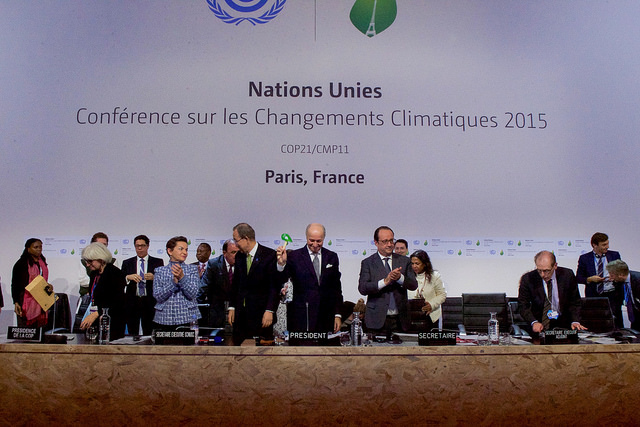
No Hasty Decision on the Paris Climate Agreement
The Trump Administration is considering whether to remain a party to the Paris Agreement, the landmark climate deal involving a commitment by 197 nations to limit the global temperature increase to less than 2° Celsius over pre-industrial levels. Factions within the administration appear to be divided over whether the official agreement text allows a decrease in national emission reduction targets; if the administration decides that the United States’ Nationally Determined Contribution (the system through which countries make reduction pledges) cannot be lowered, then the likely outcome will be to exit the agreement.
The United States leaving the Paris Agreement could have dangerous consequences for the climate. The Paris goals are difficult enough to achieve as it is, and become only more difficult to reach if a country as large as the US fails to meet its emission reduction targets. Despite this, pledges to renegotiate or withdraw from the agreement were prominent features of the last year’s presidential election, so the administration may feel political pressure to uphold a campaign promise. This is pressure the administration should resist. As ASP has argued remaining a party to the Paris Agreement can be consistent with other administration policies and withdrawing would damage US credibility in a host of other international policy areas.
Trade Agreements and the Paris Agreement
Withdrawing from the Paris Agreement could hurt the United States in another of the administration’s high priority issues. International trade agreements, often the subject of similar campaign rhetoric from then-candidate Trump, could be used by countries committed to a strict interpretation of the Paris Agreement to punish perceived US non-compliance through the imposition of carbon tariffs on US goods in the global market. Similar policies have been considered and rejected in the past, but the emergence of a new international framework to address carbon emissions and the increasing awareness of the severity of the climate change threat could bring the idea back.
Carbon tariffs are typically evaluated for the ability to protect domestic industries of countries that unilaterally adopt climate policies. This analysis, from European researchers working through the Harvard Project on Climate Agreements, determined that tariffs could increase the cost of industrial raw materials or intermediate goods in the tariff-levying country and thus harm domestic consumers through higher prices for the finished products (which would also be more expensive and less competitive when exported). The future under the Paris Agreement, though, is likely one where many countries have adopted climate policies intended to make large reductions in carbon emissions. Industries in less-stringent countries, with greater ability to emit, could send goods to market more cheaply, undercutting companies that follow tougher standards. This could also undermine climate policies by shifting production to less regulated areas, leading to an increase in the emissions that the Paris Agreement is intended to curtail.
The possible tariffs would have a more direct affect on the American economy. Consumers in countries remaining a part of the Paris Agreement would have to pay a higher price to purchase American products. This would cut against the administration’s emphasis on helping American workers and companies compete in the global marketplace. Even negotiating new international trade deals – another administration priority – would prove more difficult. Foreign leaders would find it harder to make agreements with the US government if they thought political vagaries might lead to the US abandoning the commitments it had just negotiated.
Don’t Leave without Considering the Consequences
Instead of analyzing the issue in isolation, the administration needs to consider the broad policy implications of withdrawing from the Paris Agreement before it makes a final decision. American foreign policy must achieve American interests across all issues, and policymakers must evaluate the broad ramifications of an abrupt shift. Dropping out of the agreement will harm American credibility, and could lead to cascading effects that hurt American workers and worsen the threat posed by climate change. These negative consequences, which threaten some of the administration’s highest-priority issues, should lead the US to remain in the Paris Agreement.





